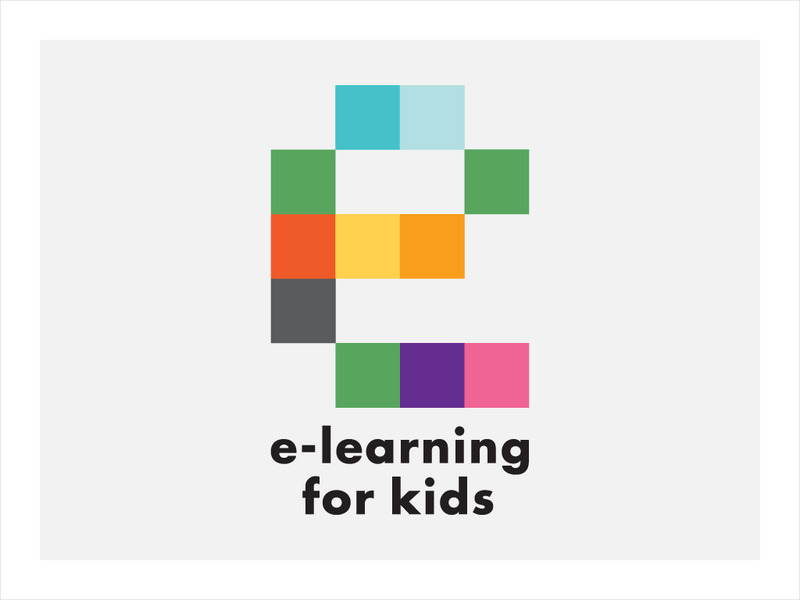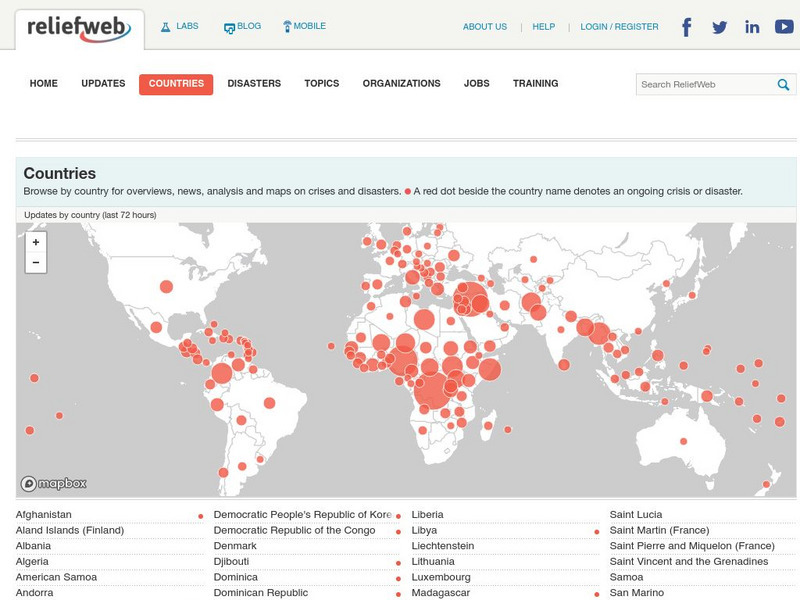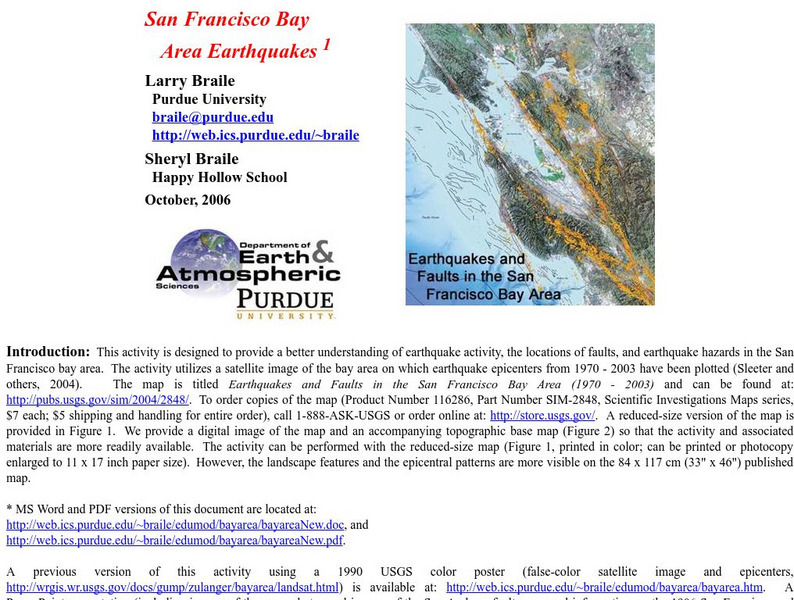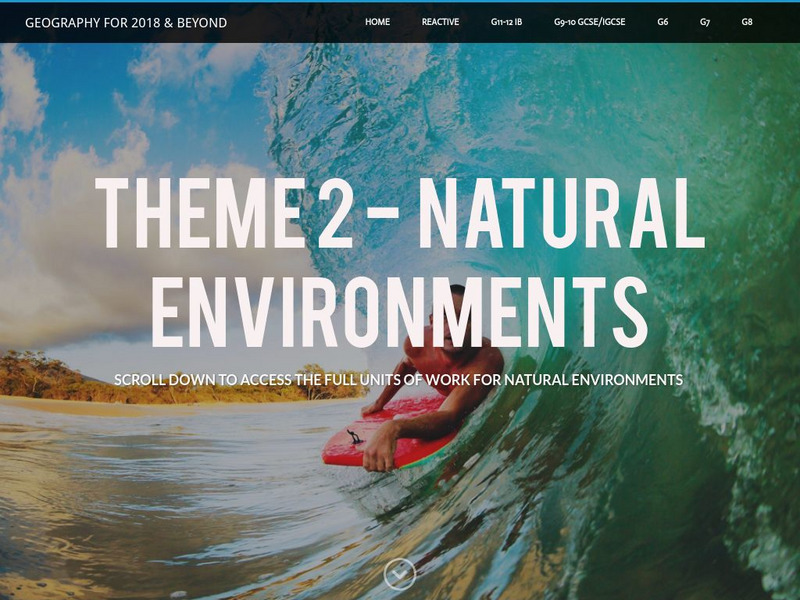E-learning for Kids
E Learning for Kids: Science: Seychelles: Earthquakes and Effects
Students learn about what happens inside the Earth to cause an earthquake, how earthquakes are measured, their impact on the surface, and safety precautions to take during an earthquake.
Natural History Museum
Natural History Museum: Volcanoes and Earthquakes
As an online exhibit from the Natural History Museum, this site provides three videos on natural processes of Earth. The videos cover tsunamis, earthquakes, and volcanoes.
US Geological Survey
U.s. Geological Survey: Earthquakes: Liquefaction
Maps and images that show liquefaction, the process by which water-filled sediment loses strength and acts like a fluid.
American Geosciences Institute
American Geosciences Institute: Earth Science Week: Mapping Quake Risk
Students use GIS to observe worldwide patterns of earthquakes and volcanoes and analyze the relationships of those patterns to tectonic plate boundaries. Then they identify cities at risk.
Science Buddies
Science Buddies: Locating the Epicenter of an Earthquake
When an earthquake happens, how are scientists able to determine the original location of the quake? In this project, you'll use archived data from a network of seismometers to find out for yourself. You'll create your own seismograms...
Science Buddies
Science Buddies: Ring of Fire 2: What Earthquakes Tell Us About Plate Tectonics
The theory of plate tectonics revolutionized geology in the 1960's. In this project you can explore the connection between plate tectonics and earthquakes by mapping historical seismic data.
Other
Relief Web: Countries
This resource provides information on countries throughout the world, current news, and different types of maps.
Other
University of Wisconsin Green Bay: Faults and Earthquakes
This site is primarily set up as an outline and is loaded with graphs, maps, and images. It covers a variety of earthquake-related topics, such as what causes earthquakes, fault lines and structures, seismology, a historical look at...
University of Wisconsin
Scien Count Ers: Earthquake Proof Buildings
This lesson looks at how the forces of an earthquake impact on buildings, and different ways to make buildings earthquake-proof. Includes student worksheet and tectonic plates map.
Texas State Historical Association
Texas State Historical Association: Notable Earthquakes Shake Texas [Pdf]
An activity guide where students refer to the Texas Almanac, which is free to download, for information needed to complete assigned tasks. In this instructional activity, they research earthquakes that have taken place in Texas, and the...
NASA
Nasa Earth Observatory: Putting Earthquakes in Their Place
Discover the location of faults by viewing a schematic Global Tectonic Activity Map. View the location of different types of faults, active spreading centers and volcanoes
Michigan Technological University
Michigan Tech University: Where Do Earthquakes Happen?
An informative site that explains how and where earthquakes occur and the different types of faults. Contains maps and charts of fault lines, plate edges, and the continental plates. There are other links within the site of related...
Other
Center for Satellite Based Crisis Information: Haiti Earthquake
Presents an overview of the January 12, 2010 earthquake that took place in Haiti and provides maps to download that show the devastation and damage that occurred.
Science Education Resource Center at Carleton College
Serc: Fairly Simple Geology Exercises
A collection of geology exercises which include relevant background information, complete instructions, student handouts, and answer keys. Topics include rock and mineral identification, Bowen's reaction series, crystal models,...
Concord Consortium
Concord Consortium: Exploring Earth's Seismicity
This sequence is an introduction to plate tectonics using evidence from topographical maps, earthquake location and depth, and volcano location using the Seismic Explorer model to investigate patterns of earthquake data and to infer the...
US Geological Survey
U.s. Geological Survey: Search Earthquake Catalog
Use this interactive map to find out about earthquakes which have happened around the world since about 1970.
US Geological Survey
U.s. Geological Survey: Learning About Earthquakes Coloring Pages
Coloring pictures of seismic waves, earthquake safety and hazard maps. [PDF] Links to other handy tools, including trivia, stories, games and fun projects.
Purdue University
Purdue University: San Francisco Bay Area Earthquakes
Students use geologic fault maps of the San Francisco Bay Area to find relationships between tectonic plate fault lines and landscape features, topographic features, and epicenters of past earthquakes.
California Institute of Technology
Scec: Significant Earthquakes and Faults
An interactive map of significant earthquakes and faults in southern California. Click on each earthquake icon, and see a brief overview of each event.
Other
1906 San Francisco Earthquake and Fire
Basic information, images, and maps of the 1906 San Francisco earthquake including numerous links to other sites.
Other
Everytrail: Trail Map of San Andreas Fault Trail Exploration
Use this map on the San Andreas Fault by following lines of posts that mark the various fault breaks in the Los Trancos Open Space Preserve. The trail takes hikers to see some of the effects of earthquakes in this otherwise tranquil...
Museum of the City of San Francisco
Virtual Museum of San Francisco: Panama Pacific International Exposition Map
See a map of the Panama-Pacific International Exposition in San Francisco in 1915. An interesting hyperlink shows a map of the same area and the buildings damaged by the earthquake in San Francisco in 1989.
Smithsonian Institution
National Museum of Natural History: Global Volcanism Program: This Dynamic Planet
Interactive activity that allows the learner to make their own regional map using layers of their choice such as volcanoes, craters, plate tectonics, or earthquakes. This map of the Earth zooms in and out, highlights essential processes,...
Geographypods
Geographypods: Theme 2: Natural Environments
A rich collection of highly engaging learning modules on topics related to the natural environment. Covers four main areas - plate tectonics, forms and processes, weather and climate, and rainforest and desert. Within each of these,...


















